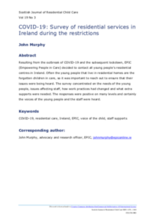Displaying 61 - 70 of 152
This study aimed to evaluate the effectiveness of the Fostering Connections program, a newly developed trauma-informed care program within the national child welfare agency in Ireland.
In this article, the authors explore how relationships in the workplace may be an important source of support for some care experienced young people.
This paper examines the implications of trauma-informed care research recently carried out in Ireland.
Resulting from the outbreak of COVID-19 and the subsequent lockdown, EPIC (Empowering People in Care) decided to contact all young people’s residential centres in Ireland. This article present the results of that survey.
This book brings together knowledge of how modern countries in Europe and the United States deal with the issue of errors and mistakes in child protection in a cross-national perspective.
This conceptual chapter from the book Education in Out-of-Home Care argues that efforts to improve educational outcomes for care experienced young people need rethinking.
Join this webinar to walk through the PROMISE Child Participation Tool and to discuss approaches and considerations for soliciting children’s views on their Barnahus experience.
The authors of this study use life course theory to explore the role of agency in shaping the educational pathways of 18 Irish adults (aged 24–36 years) with care experience.
The purpose of this webinar is to shed light on the specific experiences and issues of unaccompanied and separate girls in the European Response.
This article from BBC News shines a light on the stories of some of the people who suffered abuse and mistreatment as children in Ireland's Catholic institutions and "industrial schools."


